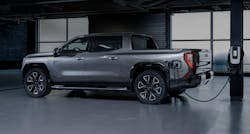A recently introduced bill will “protect American’s freedom of choice when purchasing vehicles” in the face of state electric vehicle (EV) mandates, according to its sponsors.
If signed into law, the Preserving Choice in Vehicle Purchases Act – written by U.S. Reps. Gus Bilirakis (R-FL-12), Bob Latta (R-OH5), John Joyce (R-PA13), and Jay Obernolte (R-CA23) - would “place stringent new requirements on automakers” who seek to “ban the sale of new internal combustion engine (ICE) cars and light trucks by 2035 in favor of so-called ‘zero-emission vehicles,’ like plug-in hybrid, full battery-electric, and hydrogen fuel cell vehicles.”
In 2020, California Govenor Gavin Newsom issued an executive order that would phase out the sale of gas and diesel-powered light vehicles in the state by the year 2035. The rule mandates that 35% of new cars, small trucks and SUVs sold in the state must be zero emissions, starting in 2026. The number would increase to nearly 70% by 2030 and 100% five years later.
The California Air Resource Board “has readily admitted that (California’s) action will extend beyond its state borders,” say sponsors of the bill.
As of August 2022, fifteen states have adopted both California's EV program. They include Colorado, Connecticut, Maine, Maryland, Massachusetts, Minnesota, New Jersey, Nevada, New Mexico, New York, Oregon, Rhode Island, Vermont, Virginia, and Washington.
“This would constitute 40% of the entire nation’s new car sales.”
According to proponents of the Preserving Choice in Vehicle Purchases Act, if the bill becomes law,“California would need a waiver of Clean Air Act preemption provisions from the U.S. EPA.
“The Preserving Choice in Vehicle Purchases Act would restrict the EPA from issuing any waiver for new regulations that would ban the sale or use of new motor vehicles with internal combustion engines.
“Preserving consumer choice is critical to maintaining competition in the automotive markets and ensuring all Americans have access to reliable and affordable vehicles.
“All Americans should have the freedom to choose which vehicle makes the most sense for their particular circumstances and budgets,” says Bilirakis.
“We have seen time and time again that heavy-handed government intervention – like California’s proposal to ban internal combustion engine vehicles – limits consumer choice and infringes upon Americans’ freedoms when choosing what’s best for themselves and their families,” says Latta.
“California’s misguided proposal will have ramifications that go well beyond its own borders and would make it more difficult for Americans to get to work, drop their kids off at school and travel to visit loved ones.
“I am pleased to help lead this effort in Congress - along with Reps. Joyce, Bilirakis and Obernolte - to help preserve Americans’ choices when it comes to deciding which vehicle they want – and can afford – to drive.”
“California’s discriminatory waiver request would set a costly and dangerous precedent,” says Joyce.
“One state should not be able to set national policy and Americans should not be coerced into making purchases they cannot afford.
“Congress must immediately pass the Preserving Choice in Vehicle Purchases Act to stop this heavy-handed proposal that only takes away choices from American consumers.”
“In places like my rural California district where many people commute several hours to work every day just to feed their families, electric vehicles are not only unaffordable, but also impractical,” says Obernolte.
He adds that vehicle buyers “need a market-based approach that will enable continued competition in the marketplace and push electric vehicles to be better and more affordable, while enabling people to make their own choices about what type of car to drive.”
The Specialty Equipment Market Association (SEMA) also has weighed in on California’s EV mandate.
“SEMA believes that Californians should not be directed toward a specific technology, but rather be allowed to choose the type of vehicle technology that best serves them,” says SEMA CEO Mike Spagnola.
“While electric vehicle technology expands clean transportation options, SEMA will continue to advocate on behalf of the industry that has helped make the internal-combustion engine a reliable, affordable and clean option for millions of consumers.
“SEMA supports marketplace solutions that guarantee affordable consumer choice, preserve jobs and enjoy widespread consensus within industry, government and the general public,” he adds.
Between 1980 and 2020, the combined emissions from the six most common air pollutants dropped 78%, “thanks in large part to advancements in cleaner ICE technology, which continues to improve,” according to SEMA officials



